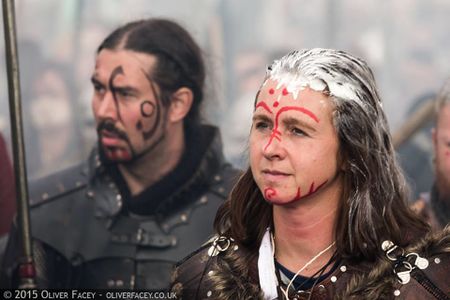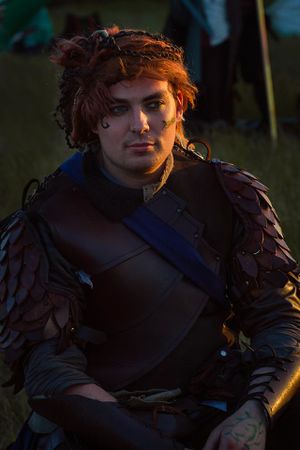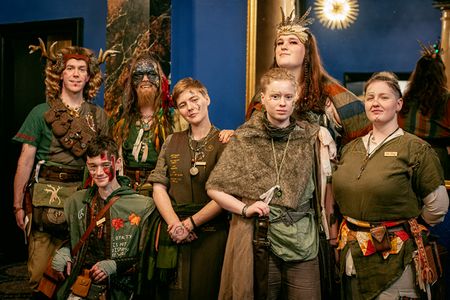Navarr people
No edit summary |
No edit summary |
||
| (83 intermediate revisions by 10 users not shown) | |||
| Line 1: | Line 1: | ||
{{CaptionedImage|file= | {{CaptionedImage|file=Tricksy Y'Basden.jpg|align=right|caption=Heirs to a fallen Empire.|width=450}} | ||
The Navarr were once part of a great nation that was lost to Orcs and failed magic centuries before the Empire began. Although they continue to wander through the wild places, they embrace the Empire as an opportunity to be a part of a great civilisation again. Their cities still exist, buried in the depths of their forests and infested by the [[vallorn]], a monstrous presence from the past. | |||
Today the people dwell in [[steading|Steadings]], settlements cut into the heart of the woods, or travel in loose groups called [[striding|Stridings]]. Individual Navarr move back and forth between the settled life of a steading and the mobile life of a striding as the mood takes them or circumstance dictates. | |||
They value self-sufficiency, priding themselves on their ability to prosper in dangerous and inhospitable areas. They | The Navarr love to travel. The journey can be a means to an end or an end in itself. Some of their journeys serve an arcane purpose, but wherever they are travelling they carry news, messages and people with them. The Navarr see moving people and items around the Empire, to the places where they can do the most good, as a method to solve many problems. The philosophy of the [[Navarr Culture and Customs#The Great Dance|Great Dance]] teaches that everyone has a place where they can prosper, and helping other people find that place is a calling for many Navarr. | ||
{{CaptionedImage|file=PensiveGuide.jpg|align=left|width=300|caption=The Navarr value self-sufficiency, and seek to test themselves<br/>against the world|title=A Navarr guide, taking a moment to consider his place in the Great Dance.}} | |||
They value self-sufficiency, priding themselves on their ability to prosper in dangerous and inhospitable areas. They make a virtue of being prepared and ready. Many Navarr love the excitement of the hunt; stalking prey heightens their senses and tests their skills and the thrill of the chase gets their blood pumping, reminding them they are alive. Young Navarr, especially, like to test themselves against the world; they like to push themselves, whether it is conquering a mountain peak or blazing a trail to a new destination. They enjoy demonstrating their mastery over nature. | |||
The Navarr are sophisticated enough to realise that self-sufficiency does not mean each individual stands alone. They are a gregarious folk who welcome strangers to their steadings and stridings. They like to cultivate friends and alliances, and relish the opportunity to work as go-betweens. Anyone in the Empire who needs to travel somewhere, or who is looking for a new start, knows that the Navarr are happy to embrace fellow travellers. | |||
The | The Navarr keep a watch throughout the Empire. When they move through an area, they make an effort to look for problems and dangers, and warn their fellow Imperial citizens about them. A Navarr who discovers a ruined Marcher fortress is now a haven of orcs or bandits will seek out nearby Marcher stewards and beaters, inform them of the problem, and offer whatever assistance they can to help them deal with the threat. | ||
{{CaptionedImage|file=Steading together.jpg|width=450|caption=Self sufficient does not have to mean standing alone.|align=right}} | |||
They also maintain a network of small shelters or safe havens along the trods known as Tarries. Each Tarry is a well-prepared shelter stocked with enough a supply of firewood and dried food for a day or two. These can be used by any traveller in need of shelter, so long as the food and firewood is restocked in return. | |||
The Navarr are as fierce towards their enemies as they are welcoming to their allies. When they march to battle they don war-paint so their allies can see they have committed themselves to the fight and their enemies know to be afraid. The Navarr have little time for notions of honourable combat; ambush, traps, misdirection and poison are all weapons that the Navarr readily employ. | |||
The Navarr are as fierce | |||
==Names== | ==Names== | ||
===First names=== | |||
Navarr names are primarily Celtic, mainly drawing on Welsh names. | |||
A child's name is given to a Navarr at birth by the parents, whereas an adult chooses the name they wish to be known by during the [[Navarr Culture and Customs|Binding of Thorns]]. | |||
===Sample Names=== | |||
Aedan, Angharad, Arawn, Breanainn, Brianna, Bronwen, Cadaen, Caiside, Cordelia, Donndubhan, Dradan, Drustan, Elisedd, Enys, Faelan, Gwynedd, Hywel, Ifan, Iona, Lindir, Logan, Maddoc, Megan, Myfanwy, Niamh, Olwen, Paul, Raelyn, Rhiannon, Saeros, Siani, Teleri, Tomas, Wyl | |||
N.B. Whilst some names are inspired by real world names which may be given to specific genders, Empire is a gender blind setting and people of any gender choose any name they like that is appropriate to their nation. | |||
===Naming resources=== | |||
* [http://www.babynames.org.uk/celtic-baby-names.htm Celtic names] | |||
* [https://www.thebump.com/b/welsh-baby-names Welsh names] | |||
===Second names=== | |||
A Navarr takes the name of their Steading or Striding as their second name. | |||
===Sample names=== | Steadings and Stridings are named for the event that founded them but these are commonly abbreviated or inferred from a much longer descriptive. The oldest communities have names founded in the myths of the Nation while those more recently founded may seem more mundane by comparison. | ||
* ''' | ===Sample second names=== | ||
* ''' | * '''Seventh Day''' - Abbreviated from "On the seventh day of the Battle of Lower Mirsh, Pwyll slew the Warlord of the Scaled Host" | ||
* '''Black Blood''' - Abbreviated from "... the rivers of Mitwold ran black with the blood of the traitors." | |||
* '''Long Stride''' - Inferred from "... and we parted ways in 307 YE as Dylan and Lowri the Vate of our Striding could not keep pace with us." | |||
Names are not static; when a Navarr moves between the steadings and the stridings they change their name accordingly. | |||
{{Navarr Links}} | |||
__NOTOC__ | |||
Latest revision as of 01:20, 7 February 2024
The Navarr were once part of a great nation that was lost to Orcs and failed magic centuries before the Empire began. Although they continue to wander through the wild places, they embrace the Empire as an opportunity to be a part of a great civilisation again. Their cities still exist, buried in the depths of their forests and infested by the vallorn, a monstrous presence from the past.
Today the people dwell in Steadings, settlements cut into the heart of the woods, or travel in loose groups called Stridings. Individual Navarr move back and forth between the settled life of a steading and the mobile life of a striding as the mood takes them or circumstance dictates.
The Navarr love to travel. The journey can be a means to an end or an end in itself. Some of their journeys serve an arcane purpose, but wherever they are travelling they carry news, messages and people with them. The Navarr see moving people and items around the Empire, to the places where they can do the most good, as a method to solve many problems. The philosophy of the Great Dance teaches that everyone has a place where they can prosper, and helping other people find that place is a calling for many Navarr.
They value self-sufficiency, priding themselves on their ability to prosper in dangerous and inhospitable areas. They make a virtue of being prepared and ready. Many Navarr love the excitement of the hunt; stalking prey heightens their senses and tests their skills and the thrill of the chase gets their blood pumping, reminding them they are alive. Young Navarr, especially, like to test themselves against the world; they like to push themselves, whether it is conquering a mountain peak or blazing a trail to a new destination. They enjoy demonstrating their mastery over nature.
The Navarr are sophisticated enough to realise that self-sufficiency does not mean each individual stands alone. They are a gregarious folk who welcome strangers to their steadings and stridings. They like to cultivate friends and alliances, and relish the opportunity to work as go-betweens. Anyone in the Empire who needs to travel somewhere, or who is looking for a new start, knows that the Navarr are happy to embrace fellow travellers.
The Navarr keep a watch throughout the Empire. When they move through an area, they make an effort to look for problems and dangers, and warn their fellow Imperial citizens about them. A Navarr who discovers a ruined Marcher fortress is now a haven of orcs or bandits will seek out nearby Marcher stewards and beaters, inform them of the problem, and offer whatever assistance they can to help them deal with the threat.
They also maintain a network of small shelters or safe havens along the trods known as Tarries. Each Tarry is a well-prepared shelter stocked with enough a supply of firewood and dried food for a day or two. These can be used by any traveller in need of shelter, so long as the food and firewood is restocked in return.
The Navarr are as fierce towards their enemies as they are welcoming to their allies. When they march to battle they don war-paint so their allies can see they have committed themselves to the fight and their enemies know to be afraid. The Navarr have little time for notions of honourable combat; ambush, traps, misdirection and poison are all weapons that the Navarr readily employ.
Names
First names
Navarr names are primarily Celtic, mainly drawing on Welsh names.
A child's name is given to a Navarr at birth by the parents, whereas an adult chooses the name they wish to be known by during the Binding of Thorns.
Sample Names
Aedan, Angharad, Arawn, Breanainn, Brianna, Bronwen, Cadaen, Caiside, Cordelia, Donndubhan, Dradan, Drustan, Elisedd, Enys, Faelan, Gwynedd, Hywel, Ifan, Iona, Lindir, Logan, Maddoc, Megan, Myfanwy, Niamh, Olwen, Paul, Raelyn, Rhiannon, Saeros, Siani, Teleri, Tomas, Wyl
N.B. Whilst some names are inspired by real world names which may be given to specific genders, Empire is a gender blind setting and people of any gender choose any name they like that is appropriate to their nation.
Naming resources
Second names
A Navarr takes the name of their Steading or Striding as their second name.
Steadings and Stridings are named for the event that founded them but these are commonly abbreviated or inferred from a much longer descriptive. The oldest communities have names founded in the myths of the Nation while those more recently founded may seem more mundane by comparison.
Sample second names
- Seventh Day - Abbreviated from "On the seventh day of the Battle of Lower Mirsh, Pwyll slew the Warlord of the Scaled Host"
- Black Blood - Abbreviated from "... the rivers of Mitwold ran black with the blood of the traitors."
- Long Stride - Inferred from "... and we parted ways in 307 YE as Dylan and Lowri the Vate of our Striding could not keep pace with us."
Names are not static; when a Navarr moves between the steadings and the stridings they change their name accordingly.
Further Reading
Core Brief
Additional Information
- History
- Leadership
- Military concerns
- Economic interests
- Religious beliefs
- Magical traditions
- Hearth magic
- Territories
- Children
- Music
- Archetypes
- Groups


